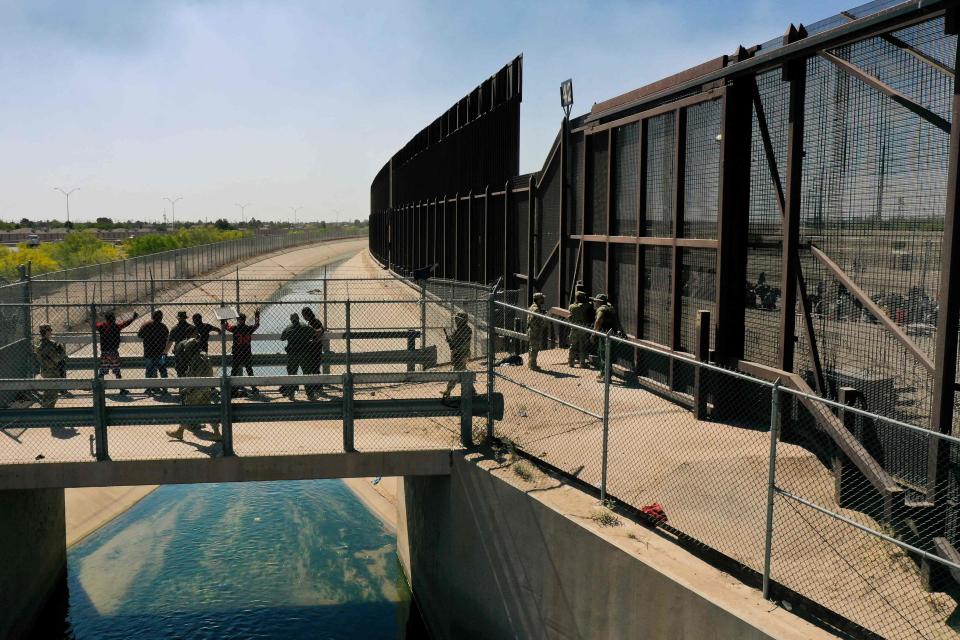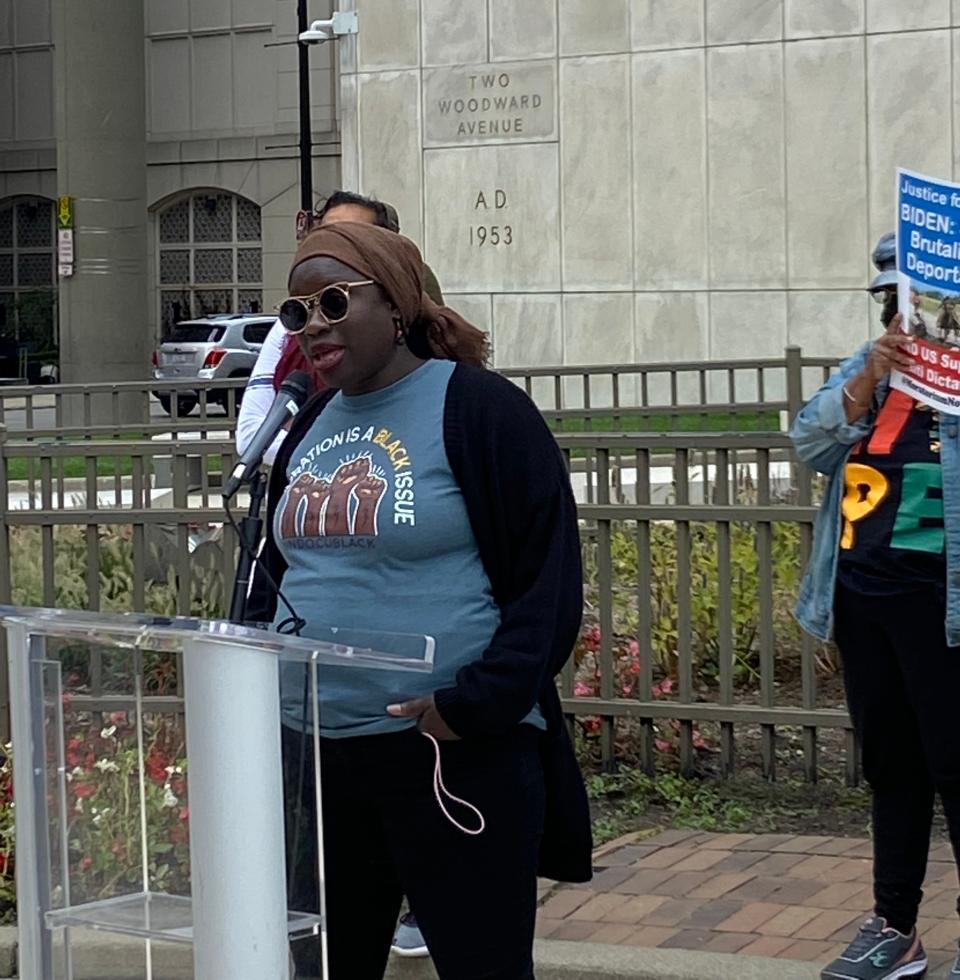Biden's immigration policy may be as restrictive as Trump's, Michigan advocates say
- Oops!Something went wrong.Please try again later.
- Oops!Something went wrong.Please try again later.
As a Trump-era immigration policy that restricted the flow of migrants seeking asylum expires at 11:59 p.m. Thursday, some worry it may bring a flood of people across the border and into cities across the U.S.
But immigrant advocates in Michigan and other states say the new rules the administration of President Joe Biden are creating to replace Title 42 — created by President Donald Trump in March 2020 near the start of the pandemic to reduce migration for health reasons — will be almost as restrictive as Trump's policies. And one advocate said it may even lead to fewer asylum seekers entering the U.S.

"When Title 42 came, Biden was very critical of it," said Seydi Sarr, founder and director of African Bureau for Immigration and Social Affairs (ABISA), a Detroit group that supports African immigrants and advocates for immigrant rights. "He actually criticized Trump and the fact that he was making it difficult for people to even apply for asylum. He was very vocal about how asylum was a right and that as Americans we should lead with our values."
But new restrictions the Biden administration plans to enact — which will block migrants at the U.S.-Mexican border from entering unless they first seek protection in a third nation or apply online, among other rules — are similar to what the Trump administration did, advocates said. An American Civil Liberties Union attorney said this week he expects a lawsuit to be filed challenging the U.S. government on its new rules.
"I'm saying to this administration ... what are you doing?" Sarr said. "The plan you have is going to have the same effect that the plan that Donald Trump had."
More: Detained immigrants desperate for help in Michigan — and Biden policies to blame | Opinion
Sarr was traveling Thursday to Texas near the border with Mexico along with immigrant rights leaders from across the U.S. with eleven different advocacy groups to assess the effects of the end of Title 42. The effort is being led by the Haitian Bridge Alliance, and includes leaders with the ACLU, Center for Constitutional Rights, Welcome with Dignity, UndocuBlack Network and other groups.
Sarr said they plan to visit Brownsville, Texas, which sits near the border, and also cities in Mexico near the border such as Matamoros and Reynosa. They plan to hold a news conference Friday to talk about their findings.
Meanwhile, some federal immigration agents from Detroit may be heading to the border to assist as the new rules take effect, said advocates and officials.
Rules replacing Title 42 may not help
Sarr said the new rules are unrealistic for migrants to follow and make it less likely for them to see an immigration judge to get access.
The new rules say that "before you cross the border, apply for asylum prior to crossing the border," Sarr said. "If I'm running for my life, how would I think I have to apply for asylum prior to crossing the border?"
Immigrant advocacy groups across the U.S. have held forums and online discussions sharing the same concerns.
The new rules replacing Title 42 are "a tactic to deter migration," said Patrick Giuliani, a policy analyst with the Hope Border Institute in a news conference streamed online Wednesday. The new rules are not easy to navigate for migrants, he said.
Ruby Robinson, managing attorney for the Michigan Immigrant Rights Center, echoed Sarr's concerns about the government's new policies.

"It would have catastrophic consequences for individuals trying to seek safety," Robinson told the Free Press. "It reminds me of a lot of the policies that came out during the last administration."
Robinson said the new policy is essentially an asylum transit ban. Earlier this year, he submitted comments criticizing a proposal by the government to make the changes.
"It's like a two-year, temporary transit ban," he said.

That's unfortunate, Robinson said, because it clashes with America's historical role in allowing for asylum and meeting treaty obligations to take in people fleeing persecution.
"While the new Biden border policy is dressed in the neutral language of incentives and disincentives, it is a major blow to U.S. commitment to asylum, an unforced error by a Democratic administration that will be hard to repair, and will result in pain and death," said Dylan Corbett, executive director of The Hope Border Institute in El Paso, Texas.
The Biden administration has defended its plans.
“Our plan will deliver results, but it will take time for those results to be fully realized,” Department of Homeland Security Secretary Alejandro Mayorkas said this week.
A reporter asked Biden Wednesday what his plans are if the new rules are blocked in court.
Biden replied: “We’ll figure that out if it’s blocked in court.”
Seeking safety
"The freedom to move has always been a part of the human experience, people are always fleeing persecution and violence and looking for better opportunities and places where they can be safe," Robinson said. "The U.S. immigration system is designed to provide opportunities for those individuals to seek protection here in the United States. That's what our asylum law is about. And that's what those treaties are about."
One group that is not affected by the news rules are unaccompanied children, Robinson said.
In Michigan, there are already thousands of asylum seekers awaiting a chance to live permanently in the U.S. Many of them moved here after arriving first in other states, Robinson and Sarr said. It's unclear whether the new changes will affect the number of asylum seekers headed to Detroit and other parts of Michigan. In contrast to other cities such as New York City, where New York City Mayor Eric Adams has criticized a recent influx, Detroit has not appeared to have had busloads with large numbers of migrants being sent here.
Asylum seekers already here are not affected by the new rules, advocates said.
In Michigan, they are escaping various types of persecution in their native lands, Robinson said.
One asylum case Robinson is currently helping to handle involves a man from Mauritania who escaped slavery.
"We talk to people on a daily basis who are fleeing abusive domestic partners in their home countries, or ... we're seeing people who are fleeing cartels, and ... horrible, horrible things," Robinson said. "One wonderful thing about the United States is we do provide opportunities for people to actually have their case heard."
The new rules have different conditions for various situations. Many asylum seekers go through ports of entry, but some enter without authorization.
"Once Title 42 is lifted, anybody who crosses the United States illegally — not at a port of entry — they will be subject to expedited removal, which means they will just get a deportation order against them immediately, which will have the effect of preventing them from returning to the United States for five years, unless specifically they say: I fear returning to my home country," Robinson explained. "And then they'll probably be detained and have an opportunity to present their claim — this is called a 'credible fear' — to an asylum officer."
The Department of Homeland Security is sending officers and other personnel to the border to help with any potential surge.
Anxiety among Michigan immigrants
Meanwhile, some immigrants already in Michigan are anxious about the changes, even though it may not directly affect them, because they are confused about the new rules, Sarr said.
She said her group is cautioning immigrants about not getting duped by shady lawyers or con artists seeking to take advantage of the confusion as Title 42 expires.
"There is also the confusion of asylum seekers who are already in the country who have not yet finished their paperwork ... who are thinking that this new rule is also going to apply to them," Sarr said. "For the last four days, we have received so many calls, where we have to explain people these new rules. ... So we are trying also to make sure that community is educated, because now there is confusion. ... That creates ... emotional strain and anxieties on the top of what they already have to deal with."
The Associated Press contributed to this report.
Contact Niraj Warikoo: nwarikoo@freepress.com or Twitter @nwarikoo.
This article originally appeared on Detroit Free Press: As Title 42 expires, Biden's immigration policy similar to Trump's

